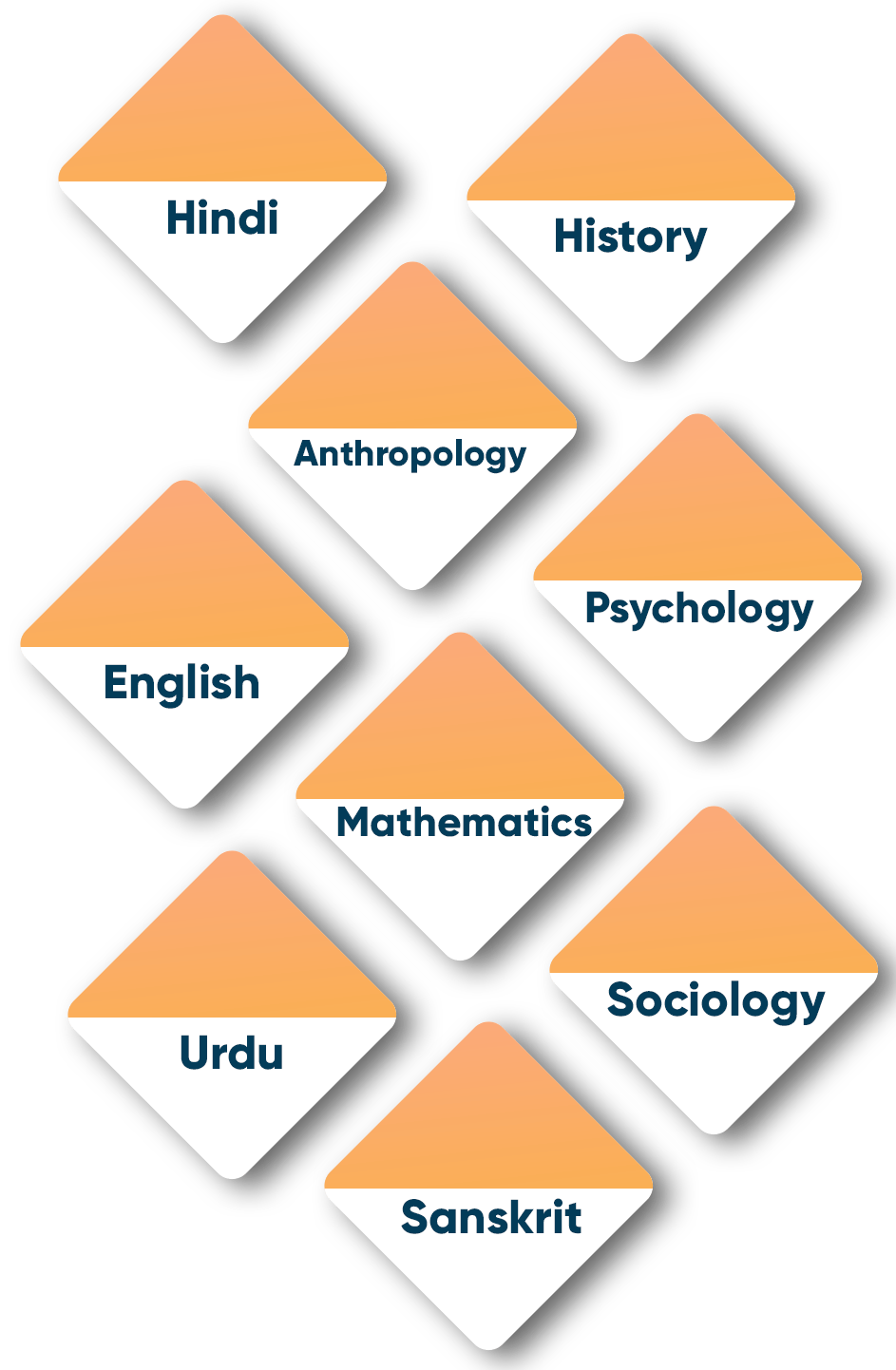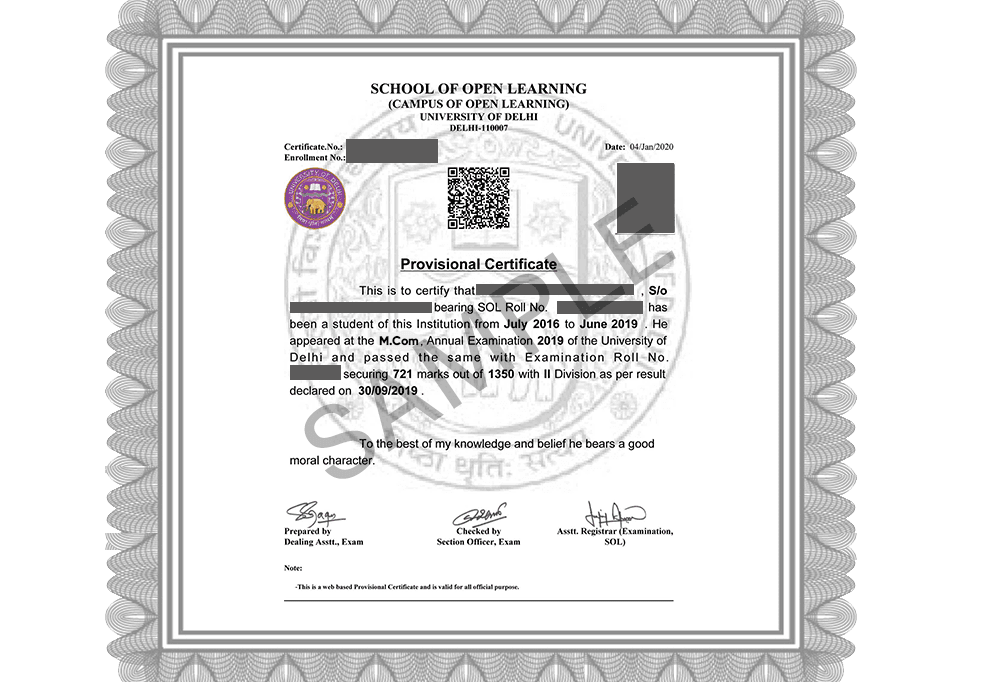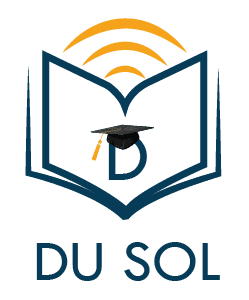DU SOL Distance BA Syllabus 2024 in Brief
DU SOL provides a BA program and honors courses with best in class updated curriculum, experienced teachers, instructors in many specializations. Some of the prominent are BA (Hindi), BA (English), BA (History), BA (Pol Science), etc. You can easily check the detailed information related to your course using the official web page of DU SOL. The examination will be conducted in pen-paper mode. The syllabus will provide you with detailed information related to your projects, assignments, core and elective courses. After reading all the things, you can manage and plan your syllabus as per your time and program. It will give you an overview related to the course which you are going to study. You can easily download your syllabus from the official website of DU SOL.
If you want to get more information related to your subject syllabus, then download the Syllabus PDF available on the DU SOL web page.
Some Necessary Points for Distance B.A Admissions:
- Online admission in Delhi University’s School of Open Learning has been closed for the last batch and the admission for the next batch will begin shortly. You will get the update here regarding the commencement date of online admission in DU-SOL for the 2024 batch.
- Students from any stream (Science/ Commerce/ Arts) can apply to this B.A specialization.
- Students can opt for such undergraduate specializations in DU SOL such as; B. A (Hons) English, B.A Programmes, B.A (Hons) Political Science, as per their choice of interest where they can get success at the higher positions.
- This Distance B. A is a 3years education program and consists of 4 different semesters.
- There is no age limit to apply for these undergraduate courses.
School of Open Learning Distance BA Fee Structure
DU SOL syllabus has a detailed course structure. You can easily check the same. We have provided broad steps related to our syllabus:
In BA Program, you need to choose a language course and two compulsory courses. Additionally, in the second and third years, you have to choose elective courses 1 and 2 as discipline courses to complete your degree program at Delhi University SOL. In case you have taken admission to Hons program like BA (Pol. Science), then you need to choose three compulsory subjects in all three years. Additionally, you need to choose a discipline and language course.
Note: You have to submit your assignments at the end of the session to appear for the exams. Assignments constitute 30% weightage in the aggregate marks.
Which Distance BA Specialization Is Best from School Of Open Learning in 2024?
DU SOL provides various courses, degrees, and diplomas. Some of the popular specializations are written below:
- BA Programme Hindi
- BA Programme History
- BA Programme Anthropology
- BA Programme English
- BA Programme Psychology
- BA Programme Mathematics
- BA Programme Urdu
- BA Programme Sociology
- BA Programme Sanskrit
- BA Online Form DU
Note: If you want to get a bachelor’s degree in B.A, then you need to pursue your degree course as per your specialization for three years. After completing your degree, you can go for further education or a job as per your choice.

B.A. Programme
SEMESTER – I
* DSC : Discipline Specific Core
**AECC : Ability Enhancement Compulsory Course
| DSC* (Any Two out of 10 Disciplines given below) |
AECC** (Any One) |
English/MIL (Any One) |
||
|---|---|---|---|---|
| # | Discipline | Name of Paper | ||
| 1 | Economics | Principles of Microeconomics – I | Environmental Science OR Communication (Any one out of the four given below) English A/B/C Hindi Tamil A/B/C Urdu A/B/C |
English Language Through Literature 80% & above in class XII English Fluency 60%-79% in class XII English Proficiency Below 60% in class XII In case student has not studied English in Class XII,following criteria is to be followed: Up to Class X – Eng. Fluency Up to Class VIII – Eng. Proficiency 10% relaxation in English marks for students who have English as as elective subject in class XII |
| 2 | Education | Basic Concepts and Ideas in Education | MIL (Hindi/Punjabi/Tamil/Urdu) A – For students who studied subject upto XII B – For students who studied subject upto X C – For students who studied subject upto VIII |
|
| 3 | English | The Individual and Society | Hindi: A/B/C Hindi A: Aadhunik Bharatiya Bhasa- Hindi: Bhasa Aur Sahitya Hindi B: Aadhunik Bharatiya Bhasa- Hindi: Bhasa Aur Sahitya Hindi C: Aadhunik Bharatiya Bhasa- Hindi: Bhasa Aur Sahitya |
|
| 4 | Hindi | Hindi Bhasha Aur Sahitya Ka Itihas | Punjabi: A/B/C Punjabi A: Punjabi Novel, Drama, and Functional Punjabi Punjabi B: Modern Punjabi Prose and Functional Punjabi Punjabi C: Punjabi Folk-Drama and Functional Punjabi |
|
| 5 | History | History of India from Earliest Times to 300 CE | Tamil: A/B Tamil A: History of Indian Language (Tamil) Tamil B: Functional Grammar of the Language |
|
| 6 | Mathematics | Calculus | Urdu: A/B/C Urdu A: Study of Modern Urdu Prose and Poetry – I Urdu B: Study of Modern Urdu Prose and Poetry – II Urdu C: Urdu Nisab – I |
|
| 7 | NHE | Fundamentals of Nutrition and Food Science | In Lieu of MIL: (Any One out of two given below) 1. Economics: Principles of Microeconomics – I (Not for students taking the same paper as DSC) 2. Political Science: Globalising World |
|
| 8 | Political Science | Introduction to Political Theory | ||
| 9 | Sanskrit | Sanskrit Poetry | ||
| 10 | Commerce (Any One) | Commerce: (i) Group : Human Resource Management – Human Resource Management (ii) Group : Business Law – Mercantile Law |
||
SEMESTER – II
| DSC (Two Disciplines as opted in Semester I) |
AECC (Any one not opted earlier in Sem-I) |
English/MIL (Any One) |
||
|---|---|---|---|---|
| # | Discipline | Name of Paper | ||
| 1 | Economics | Principles of Microeconomics – II | Environmental Science OR Communication (Any one out of the four given below) English A/B/C Hindi Tamil A/B/C Urdu A/B/C |
English Language Through Literature 80% & above in class XII English Fluency 60%-79% in class XII English Proficiency Below 60% in class XII In case student has not studied English in Class XII,following criteria is to be followed: Up to Class X – Eng. Fluency Up to Class VIII – Eng. Proficiency 10% relaxation in English marks for students who have English as as elective subject in class XII |
| 2 | Education | Understanding Human Development | MIL (Hindi/Punjabi/Tamil/Urdu) A – For students who studied subject upto XII B – For students who studied subject upto X C – For students who studied subject upto VIII |
|
| 3 | English | Selections from Modern Indian Literature | Hindi: A/B/C Hindi A: Aadhunik Bharatiya Bhasa- Hindi: Bhasa Aur Sahitya Hindi B: Aadhunik Bharatiya Bhasa- Hindi: Bhasa Aur Sahitya Hindi C: Aadhunik Bharatiya Bhasa- Hindi: Bhasa Aur Sahitya |
|
| 4 | Hindi | Hindi Kavita (Madhya Kaal, AadhunikKaal) | Punjabi: A/B/C Punjabi A: Punjabi Novel, Drama, and Functional Punjabi Punjabi B: Modern Punjabi Prose and Functional Punjabi Punjabi C: Punjabi Folk-Drama and Functional Punjabi |
|
| 5 | History | History of India c. 300 to 1200 | Tamil: A/B Tamil A: History of Indian Language (Tamil) Tamil B: Functional Grammar of the Language |
|
| 6 | Mathematics | Algebra | Urdu: A/B/C Urdu A: Study of Modern Urdu Prose and Poetry – I Urdu B: Study of Modern Urdu Prose and Poetry – II Urdu C: Urdu Nisab – I |
|
| 7 | NHE | Nutrition for the Family | In Lieu of MIL: (Any One out of two given below) 1. Economics: Principles of Microeconomics – I (Not for students taking the same paper as DSC) 2. Political Science: Globalising World |
|
| 8 | Political Science | Indian Government and Politics | ||
| 9 | Sanskrit | Sanskrit Prose | ||
| 10 | Commerce (Any One) | Commerce: (i) Group : Human Resource Management – Industrial Relations (ii) Group : Business Law – Partnership Laws |
||
SEMESTER – III
| DSC (Two Disciplines as opted in Semester I) |
Skill Enhancement Course SEC (Any One) | English/MIL (Any One) |
||
|---|---|---|---|---|
| # | Discipline | Name of Paper | ||
| 1 | Economics | Principles of Macroeconomics – I | Economics- Understanding Economic Survey and Union Budget | English Language Through Literature –2 80% & above in class XII English Fluency –2 60%-79% in class XII English Proficiency –2 Below 60% in class XII In case student has not studied English in Class XII,following criteria is to be followed: Up to Class X – Eng. Fluency Up to Class VIII – Eng. Proficiency 10% relaxation in English marks for students who have English as as elective subject in class XII |
| 2 | Education | Education in Contemporary India | Education – Researching Children and Childhoods in India | MIL (Hindi/Punjabi/Tamil/Urdu) A – For students who studied subject upto XII B – For students who studied subject upto X C – For students who studied subject upto VIII |
| 3 | English | British Literature: Poetry and Play Selections from Living Literature: An Anthology of Prose and Poetry *Renaissance Poetry *18th Century Poetry *Romantic age Poetry (b)Play : Othello |
English – Translation Studies | Hindi: A/B/C Hindi A: Aadhunik Bharatiya Bhasha Hindi Gadya : Udbhav Aur Vikas Hindi B: Aadhunik Bharatiya Bhasha Hindi Gadya : Udbhav Aur Vikas Hindi C: Aadhunik Bharatiya Bhasha Hindi Gadya : Udbhav Aur Vikas |
| 4 | Hindi | Hindi Katha Sahitya | History – Introduction to Art in the Indian Sub-continent | Punjabi: A/B/C Punjabi A: Medieval Narrative Poetry, Auto- Biography and Functional Punjabi Punjabi B: Ethics – Literary Responses and Functional Punjabi Punjabi C: Punjabi Auto-Biography and Functional Punjabi |
| 5 | History | History of India,c. 1200-1700 | Sanskrit- Yogasutra of Patanjali | Tamil: A/B Tamil A: History of Ancient Tamil Literature Tamil B: History of Modern Tamil Literature |
| 6 | Mathematics | Analytic Geometry and Applied Algebra | Urdu A : Study of Modern Urdu Fiction Novel Short Story (Code : 62141902) Urdu B: Study of Medieval Prose & Poetry (Code : 62141903) Urdu C: Urdu Nisab-II (Code : 62141904 ) |
|
| 7 | NHE | Introduction to Food Safety | In Lieu of MIL: (Any One out of two given below) (Not for students taking the same paper as DSC) 1. Economics: Principles of Macroeconomics – I 2. Political Science- Administration and Public Policy |
|
| 8 | Political Science | Comparative Government and Politics | ||
| 9 | Sanskrit | Sanskrit Drama | ||
SEMESTER – IV
| DSC (Two Disciplines as opted in Semester I) |
Skill Enhancement Course SEC (Any One) |
English/MIL (Any One) |
||
|---|---|---|---|---|
| # | Discipline | Name of Paper | ||
| 1 | Economics | Principles of Macroeconomics II | Economics – Data Analysis | English Language Through Literature –2 80% & above in class XII English Fluency –2 60%-79% in class XII English Proficiency –2 Below 60% in class XII In case student has not studied English in Class XII,following criteria is to be followed: Up to Class X – Eng. Fluency Up to Class VIII – Eng. Proficiency 10% relaxation in English marks for students who have English as as elective subject in class XII |
| 2 | Education | Understanding Human Learning and Cognition | Education – Reflective Learning | MIL (Hindi/Punjabi/Tamil/Urdu) A – For students who studied subject upto XII B – For students who studied subject upto X C – For students who studied subject upto VIII |
| 3 | English | Literary Crosscurrents: Selections from Living Literatures: An Anthology of Prose and Poetry |
English – Translation Studies (For those students who have not opted in Sem III) |
Hindi: A/B/C Hindi A: Aadhunik Bharatiya Bhasha Hindi Gadya : Udbhav Aur Vikas Hindi B: Aadhunik Bharatiya Bhasha Hindi Gadya : Udbhav Aur Vikas Hindi C: Aadhunik Bharatiya Bhasha Hindi Gadya : Udbhav Aur Vikas |
| 4 | Hindi | Anya Gadya Vidhaayen | History-Archives and Museum | Punjabi: A/B/C Punjabi A: Medieval Narrative Poetry, Auto- Biography and Functional Punjabi Punjabi B: Ethics – Literary Responses and Functional Punjabi Punjabi C: Punjabi Auto-Biography and Functional Punjabi |
| 5 | History | History of India, c. 1700-1950 | Sanskrit – Indian Architecture System | Tamil: A/B Tamil A: History of Ancient Tamil Literature Tamil B: History of Modern Tamil Literature |
| 6 | Mathematics | Analysis | Urdu A : Study of Modern Urdu Fiction Novel Short Story (Code : 62141902) Urdu B: Study of Medieval Prose & Poetry (Code : 62141903) Urdu C: Urdu Nisab-II (Code : 62141904 ) |
|
| 7 | NHE | Public Health Nutrition | In Lieu of MIL: (Any One out of two given below) (Not for students taking the same paper as DSC) 1. Economics: Principles of Macroeconomics – I 2. Political Science- Administration and Public Policy |
|
| 8 | Political Science | Introduction to International Relations | ||
| 9 | Sanskrit | Sanskrit Grammar | ||
SEMESTER – V
| DSE (Two Disciplines as opted in Semester I) |
Skill Enhancement Course (SEC) (Any One) |
Generic Elective (GE) (Any One) |
||
|---|---|---|---|---|
| # | Discipline | Name of Paper | ||
| 1 | Economics | Economics : Economic Development and Policy in India-I | Economics : Research Methodology | Economics : Principles of Microeconomics |
| 2 | Education | Education : Education in a Plural Society | Education : Making the Workplace Inclusive | English : Bestsellers and Genre Fiction |
| 3 | English | English : Detective Literature | History : Popular Culture | Hindi: Anuvaad : Vyavhaar Aur Siddhant |
| 4 | Hindi | Hindi Bhasha ka Vyavharik Vyakaran | Political Science : Your Laws Your Rights | History : Gender in Modern World |
| 5 | History | History : Issues in Twentieth Century World History I | Sanskrit : Basic Elements of Ayurveda | Political Science : Understanding Gandhi |
| 6 | Mathematics | Mathematics : Statistics | Sanskrit : Nationalistic Thought in Sanskrit Literature | |
| 7 | NHE | NHE : Public Nutrition | Commerce : Modern Business Organisation |
|
| 8 | Political Science | Political Science – Administration and Public Policy: Concept and Theories | ||
| 9 | Sanskrit | Philosophy, Religion and Culture in Sanskrit Tradition | ||
DU SOL Sample Certificate
Earn a UGC & AICTE, NAAC A++ -recognised degree from DU SOL
- Learn from the best faculty and industry experts.
- Become a part of the DU SOL Alumni network.
- Build job-ready skills to get ready for the workforce.

Who is Eligible for School of Open Learning Admissions?
UG Courses
- 10+2 from a recognized Education Board
- A minimum of 45-50% marks in the qualifying exam.
- Basic Knowledge of the English language.
PG Courses
- Graduation from a recognized university.
- At least 45-50% marks in the qualifying exam.
- Must have studied the English language at 10+2 or graduation level.
Note: For some courses, the university might conduct an entrance exam & the eligibility will also depend on the scores of that exam.

DU SOL Admissions FAQ
You need to visit the official website of DU SOL to get the admission brochure and other important details.
Yes, DU SOL offers a BA specialization in History. You have to check the syllabus for the same to plan yourself for further studies.
Yes, for the offline syllabus, you have to visit the DU SOL as the institution will provide you offline prints of the same.
